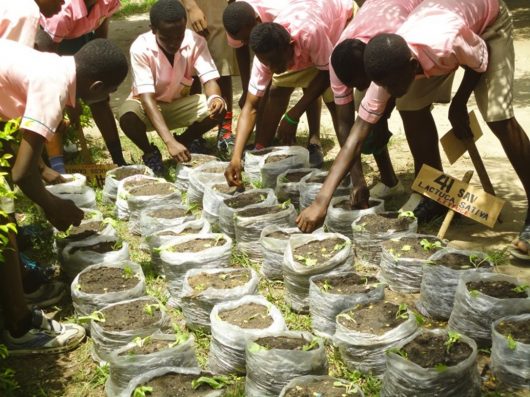
InFACT aims to address food insecurity both on campus and internationally. Credit: Courtesy of 4H Ghana
Although Ohio’s economy is largely based on agriculture, many people in Ohio do not have access to healthy food.
In fact, according to the United States Department of Agriculture, 16 percent of households in Ohio are food insecure, well above national and regional averages.
A team of researchers at Ohio State is addressing this problem as part of the Initiative for Food and AgriCultural Transformation by researching food production and distribution systems at OSU, in Columbus and around the world.
“Food insecurity goes beyond whether a person is hungry or not,” said Brian Snyder, the executive director of InFACT. “Food security is a bigger idea. Does a person or does a family normally have access to good, healthy food so there’s not a sense of anxiety all the time about where their food is coming from?”
“Any person should be able to find out where (the food on campus) came from, how it was processed and how it was produced, so it isn’t anonymous food. That’s the enemy — food we know nothing about.” — Brian Snyder, the executive director of InFact.
InFACT is working to eliminate food insecurity not only by encouraging research, but also by developing sustainable models of food production and distribution that can be tested at OSU before being applied to regional, and even global, food systems.
Currently, InFACT is working to ensure that within the next 10 years, 40 percent of the food provided on campus is locally and sustainably produced, while providing complete transparency about where and how the rest of the food provided on campus is produced.
“Any person should be able to find out where (the food on campus) came from, how it was processed and how it was produced, so it isn’t anonymous food,” Snyder said. “That’s the enemy — food we know nothing about.”
Furthermore, InFACT wants to produce some of that food directly on campus.
“We’d like to work to identify new spaces where we could possibly implement new projects to help transform our landscape all around us for production purposes,” said Nicole Pierron Rasul, a program coordinator for InFACT.
This includes planting apple trees, berry bushes and plants to attract pollinators, so students can learn about food production, while also experiencing the benefits of eating healthy, locally grown food, Rasul said.
In the broader Columbus community, InFACT is partnering with community leaders, and local and urban farmers to develop sustainable production techniques, while recognizing the climate change in Ohio.
This is part of a pilot project known as Ohio Smart Agriculture: Solutions from the Land, and if successful, the strategies and farming techniques created will be applied to other states in the upper Midwest.
Finally, InFACT also aims to reduce food insecurity on a global level. While part of this goal entails applying the strategies developed at OSU and in Columbus to food-insecure countries, some researchers involved in InFACT are working on projects to address country-specific issues.
For example, one such project is working to identify unexploded bombs in Cambodia that are preventing the use of agricultural land.
Ultimately, InFACT aims to address food insecurity by transforming the systems behind food production and distribution, so that food is produced in a more environmentally sustainable way and so that people have access to healthy and locally grown food.
“We are advocating broadly for food security as a basic human right,” Snyder said. “We feel that everybody has a right to good, healthy food.”
The Engaged Scholars logo accompanies stories that feature and examine research and teaching partnerships formed between the Ohio State University and the community (local, state, national and global) for the mutually beneficial exchange of knowledge and resources. These stories spring from a partnership with OSU’s Office of Outreach and Engagement. The Lantern retains sole editorial control over the selection, writing and editing of these stories.



